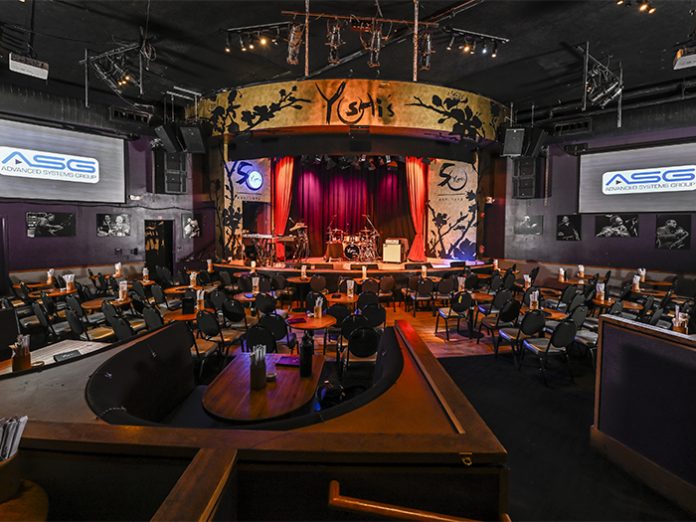After relying on a venerable Meyer Sound system since first opening at its current location in 1997, Yoshi’s legendary jazz club in Oakland, California recently upgraded to a new system incorporating the latest technologies from the same company. Supplied by Advanced Systems Group (ASG) based nearby in Emeryville, the new Meyer Sound installation has earned unstinting praise from management, artists, guest engineers, and patrons alike.
“Every artist that has come in here has been blown away,” says Yoshi’s Production Manager Marcel Quiroz. “Haley Reinhart’s engineer told me it was the best house system he’d ever heard, and the engineer for Dave Weckl said that hands down we now have the best-sounding room in the Bay Area. After his set, Freddy Jackson came up, gave me a hug, and said, ‘Thank you!’”
The prior system had served Yoshi’s well, reinforcing the music of jazz, R&B, and associated pop luminaries for a quarter century. But a grueling schedule of two shows six or seven nights a week, when combined with some questionable changes in front-end processing, had dulled the luster of the system. These signs of aging, along with demand for stronger bass by contemporary R&B acts, prompted Quiroz and General Manager Hal Campos to look at giving the venue a complete audio renovation.
Preliminary plans were put on hold during the Covid shutdowns, but when business rebounded, Yoshi’s gave the green light to move forward with a new system. Final designs were generated by Joe Mistretta of Meyer Sound Design Services working in collaboration with the ASG Audio Team and Key Accounts Manager Tom Menrath.
The new Yoshi’s system comprises two UPQ-D1 wide coverage and two UPQ‑D2 narrow coverage full-size loudspeakers for the mains, supplemented by three ULTRA-X20 compact wide coverage loudspeakers for downfill and seven UP-4slim ultra-compact installation loudspeakers for front fill. Ample power for contemporary R&B acts is now available through four 900-LFC low-frequency control elements, mounted in pairs on the walls. A Galileo GALAXY 816 Network Platform provides system drive and optimization, while artist foldback has been upgraded with the addition of 10 MJF-208 and two MJF-210 stage monitors.
“Down time is expensive for Yoshi’s as it costs not only the performance venue but their foundational restaurant business,” noted ASG’s Menrath, “so it was vital to get the new system up and running as fast as possible. Working with Brad Katz of Waveworks, we were able to get the old system out, the new one in, tuned, and back in action within nine days.”
Among the first to hear the new system were two of Yoshi’s founders and owners, namesake Yoshie Akiba and Kaz Kazamura. “When I turned it on, it literally brought tears to their eyes,” recalled Quiroz. “They had never heard this room sound so good.”
As an avid musician, Tom Menrath found this relatively small project nevertheless highly rewarding. “We do a lot of major projects with Meyer Sound, including huge installations for well-known Silicon Valley corporations, but Yoshi’s has been particularly satisfying,” he says. “This new system with the most advanced loudspeaker technologies is a stunning upgrade, and the artists who perform at Yoshi’s certainly deserve nothing but the best the industry can offer.”
Artists who have performed at Yoshi’s since the system upgrade — in addition to Weckl, Reinhart, and Jackson — include Jose Feliciano, Jesse Colin Young, Sheila E, Sergio Mendes, Arturo Sandoval, and Les Claypool.
Now celebrating its golden anniversary, Yoshi’s was first established as an intimate sushi bar by Yoshie Akiba (the “e” on her first name dropped for the restaurant) and her close friends in 1972. Seven years later, Yoshi’s moved to a larger location in Berkeley’s Claremont neighborhood, mainly to accommodate Akiba’s passion for dance and live jazz. In 1997, Yoshi’s moved again, this time to even larger accommodations at Oakland’s Jack London Square, where the expanded restaurant is complemented by the 330-seat music venue.
The original system installed for Jack London Square deployed Meyer Sound CQ‑1 and CQ-2 self-powered loudspeakers for the mains, with UPA-1P and HM-1 loudspeakers for fills and PSW-2 subwoofers for the low end.





